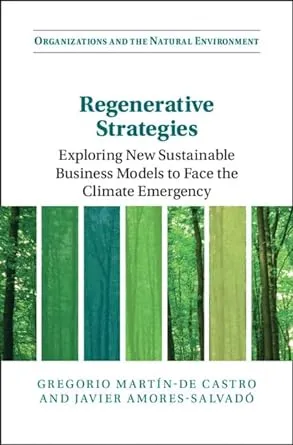The authors of this book propose a new regenerative business management strategy that seeks to reduce negative environmental externalities and create new positive environmental externalities by linking climate science to management studies.

Summary
In this book, Gregorio Martin-de Castro and Amores-Salvadó propose a new regenerative strategy that combines management studies with climate science. They argue that disruptive solutions and business models are required to address the climate emergency and prevent business greenwashing. They imagine a new ‘sustainable capitalism’ which relies on new technology solutions and a paradigm shift within stakeholder management practices that takes a long-term view. They hope to contribute to efforts to reduce negative environmental externalities and potentially create positive environmental externalities through the implementation of this new business management strategy.
Publisher’s description
In the current climate emergency, it is no longer enough for businesses to simply employ environmental strategy typologies focused on 'greening the business' and maintaining the 'business-as-usual' logic. Gregorio Martín-de Castro and Javier Amores-Salvadó argue that disruptive business models and solutions are now required, and they propose a new regenerative strategy linking climate science to management studies. The main features of this strategy are: cutting-edge climate science solutions (capturing and utilizing atmospheric carbon dioxide to produce net-zero or net-negative emissions and positive environmental externalities) and a redefined firm purpose under an ecological, ethical and moral paradigm (integrating ecoemotional wealth, environmental performance, systemic socioecological resilience, wider stakeholder management and a very long-term perspective). They demonstrate that, by applying this strategy, companies can not only reduce their negative environmental externalities and create positive environmental externalities, but also reverse current environmental degradation through a new sustainable capitalism.
Reference
Martín-de Castro, G., Amores-Salvadó, J., 2024. Regenerative Strategies: Exploring New Sustainable Business Models to Face the Climate Emergency, Organizations and the Natural Environment. Cambridge University Press, Cambridge, UK.
Read more here and see our explainer on What is ecomodernism?




Comments (0)